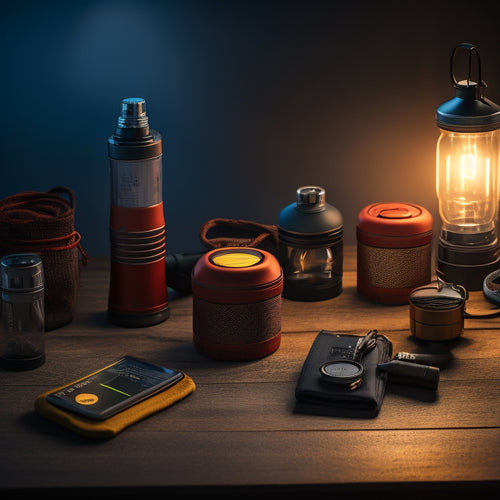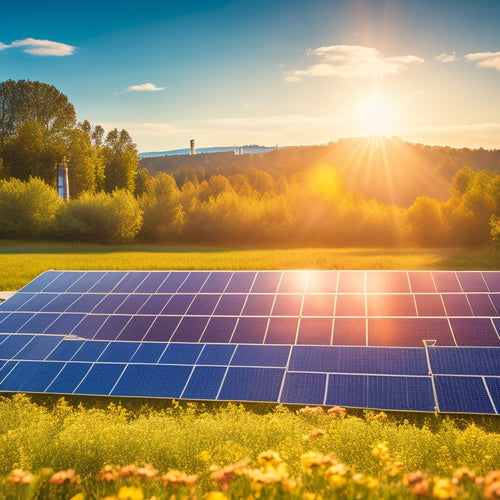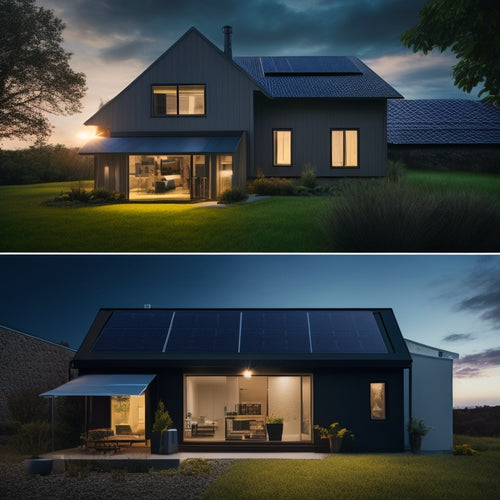
What Powers Your Pool Efficiently at Home?
Share
You can power your pool efficiently at home by leveraging solar energy, a sustainable and eco-friendly alternative to traditional heating methods that can help reduce your utility bills and carbon footprint. Solar pool covers reduce heat loss, while solar heating systems use panels to heat water directly, providing considerable cost savings and extending your swim season. With the right solar panel efficiency, pump horsepower, and motor efficiency factors in place, you can optimize your pool's energy use. By understanding these key factors and implementing changes, you can considerably reduce your utility bills and make a positive impact on the environment - and that's just the beginning of what you can achieve.
Overview
- Solar pool heating systems harness free energy from the sun to reduce reliance on fossil fuels and lower utility bills.
- Energy-efficient pumps with high Energy Star ratings minimize energy consumption and support environmental sustainability.
- Correctly sizing pump horsepower and optimizing pump usage lead to significant energy savings and reduce energy waste.
- Installing solar panels at an ideal angle and direction maximizes sunlight exposure and energy generation.
- Regular maintenance of pool equipment, including motors and filters, ensures optimal performance and energy efficiency.
Harnessing Solar Energy for Pools
How much energy are you wasting on your pool's heating system? Traditional heating methods can be costly and inefficient.
Fortunately, utilizing solar energy for pools offers a sustainable alternative. By incorporating eco-friendly materials and strategic positioning, similar to solar-powered corner units, you can reduce your reliance on grid electricity and minimize your carbon footprint.
Solar pool covers, for instance, can greatly reduce heat loss by trapping warmth in the water. These covers are designed to allow sunlight to pass through, warming the pool while preventing heat from escaping.
Solar heating systems take it a step further by using solar panels to heat the water directly. These systems can be integrated with your existing pool setup, providing a seamless shift to a more eco-friendly and cost-effective solution.
Benefits of Solar Pool Heating
By investing in solar pool heating, you're positioned to reap a multitude of benefits that extend beyond mere environmental responsibility.
You'll enjoy significant cost savings, as solar energy is free and abundant, reducing your reliance on fossil fuels and lowering your utility bills.
Additionally, solar pool heating minimizes your environmental impact, reducing greenhouse gas emissions and contributing to a cleaner, healthier planet.
By shifting to solar power, you'll also gain energy independence and reduce your carbon footprint, making a significant contribution to a cleaner environment.
With solar pool heating, you'll also experience extended swim seasons, as the system can heat your pool to a comfortable temperature even during cooler months.
Moreover, solar pool heating systems require minimal maintenance and have a long lifespan, providing you with a hassle-free pool experience.
Understanding Solar Panel Efficiency
You're likely curious about the efficiency of solar panels, an essential aspect of utilizing solar energy for your pool. Understanding solar panel efficiency helps you make informed decisions when selecting the right system for your needs. Efficiency ratings vary among solar panel types, with monocrystalline silicon being the most efficient.
| Solar Panel Type | Efficiency Rating |
|---|---|
| Monocrystalline Silicon | 20-22% |
| Polycrystalline Silicon | 15-18% |
| Thin Film | 7-14% |
| Bifacial | 18-22% |
| PERC | 18-21% |
When choosing a solar panel, consider the efficiency rating, as it directly affects the amount of energy generated. Higher efficiency ratings translate to more energy produced per unit area, making them ideal for smaller spaces. By understanding solar panel efficiency, you can optimize your pool's energy consumption and enjoy a more sustainable and cost-effective solution.
Pool Pump Energy Consumption
When it comes to pool pump energy consumption, you'll want to pay attention to the pump's horsepower, as it directly impacts your energy costs.
You should also look for pumps with Energy Star ratings, which indicate they meet energy efficiency standards set by the U.S. Environmental Protection Agency.
Moreover, consider the motor efficiency factor, which affects how well the pump converts electrical energy into hydraulic energy.
In addition, deep cycle batteries, ideal for solar applications, can be used to store excess energy generated by solar panels, enabling a stable power supply when sunlight is unavailable, and reducing reliance on the grid.
This approach can lead to significant energy savings and increased energy independence.
Pump Horsepower Matters
Operating a pool pump at the correct horsepower is crucial, as it directly impacts your energy consumption and overall pool maintenance costs. You need to verify that your pump is properly sized for your pool's specific needs. A pump that's too small won't circulate water efficiently, while one that's too large will waste energy and increase your bills.
| Horsepower | Pump Sizing | Energy Consumption |
|---|---|---|
| 0.5 HP | Small pools (<10,000 gal) | Low energy consumption |
| 1.0 HP | Medium pools (10,000-20,000 gal) | Moderate energy consumption |
| 1.5 HP | Large pools (20,000-30,000 gal) | High energy consumption |
| Variable Speed | Customizable for any pool size | Energy consumption varies based on speed |
Using a variable speed pump can help you optimize energy consumption and save on costs. It's vital to consult with a professional to determine the right horsepower and pump sizing for your pool.
Energy Star Ratings
Since energy consumption is a significant factor in pool maintenance costs, it's essential to take into account the Energy Star rating of your pool pump.
You'll want to look for pumps with high energy efficiency, as they'll help reduce your energy bills and minimize your environmental impact.
The Energy Star program, backed by the U.S. Environmental Protection Agency, certifies pumps that meet strict energy efficiency guidelines.
When shopping for a new pump, opt for eco-friendly options with the Energy Star label.
These pumps use advanced technology to reduce energy consumption while maintaining peak performance.
Motor Efficiency Factors
Beyond the Energy Star rating, several motor efficiency factors impact your pool pump's energy consumption.
You'll want to take into account the motor type, as it greatly affects energy usage. For instance, inverter-driven motors and brushless DC motors are more efficient than traditional induction motors.
Proper pump maintenance is also essential, as it guarantees your motor operates at its best. Regularly clean your pump's filter and impeller to prevent clogs, which can decrease efficiency.
Additionally, check your motor's bearings and lubricate them as needed to reduce friction.
Optimizing Your Pool's Energy Use
Upgrade your pool's energy efficiency by identifying and addressing energy-wasting culprits.
Start by inspecting your pool's equipment, looking for areas where energy is being wasted. Implement energy saving tips, such as adjusting your pump's schedule to run during off-peak hours or using a timer to optimize its operation.
Consider investing in automated systems that can help you monitor and control your pool's energy use. By making these adjustments, you can considerably reduce your pool's energy consumption, saving you money on your utility bills and minimizing your environmental impact.
Solar Power System Installation Tips
You're considering utilizing the power of the sun to energize your pool, and that's a great decision.
When it comes to solar power system installation, you'll want to choose the right solar panel types for your needs. Monocrystalline and polycrystalline panels are popular options, each with their own efficiency and cost benefits.
During the installation process, verify your solar panels are installed at an angle and direction that maximizes sunlight exposure. A south-facing installation with a tilt of 30-40 degrees is usually ideal.
Additionally, consider the installation location's shading, wind, and snow loads to guarantee peak performance.
Frequently Asked Questions
Can I Use Solar Power for My Hot Tub or Spa?
You can tap into solar hot water systems to power your hot tub or spa, leveraging energy efficiency and reducing your carbon footprint, as solar panels capture free energy from the sun to heat water, giving you freedom from utility bills.
How Long Do Solar Pool Heating Systems Typically Last?
You'll typically get 15-20 years of use from a solar pool heating system, but with proper maintenance tips, like regular cleaning and inspection, you can extend its lifespan, ensuring your solar panel's efficiency and freedom from high energy bills.
Are Solar Panels Noisy During Operation?
"Blood is thicker than water," but when it comes to solar panels, you'll find they're quieter than a whisper. During solar panel operation, noise levels are almost imperceptible, typically around 30-40 decibels, making them a peaceful addition to your home.
Can I Install a Solar Power System Myself?
You can attempt a DIY installation of a solar power system, but be aware that it requires significant technical knowledge and adherence to safety protocols to utilize solar energy efficiently and safely.
Are There Any Local Incentives for Solar Pool Heating Systems?
You'll find local incentives for solar pool heating systems through rebates from utility companies and municipalities, as well as federal and state tax incentives, which can greatly reduce your upfront installation costs.
Ready to Buy
As you immerse yourself in the world of efficient pool powering, remember that utilizing solar energy is the key to revealing a cost-effective and eco-friendly haven. Like a perfectly balanced chemical equation, a well-designed solar power system harmonizes with your pool's energy needs, reducing your carbon footprint and energy bills. By optimizing your pool's energy use, you'll be swimming in a sea of savings, while basking in the warmth of a guilt-free summer.
Related Posts
-

Best Solar Powered Flashlights for Emergency Situations
When you're choosing the best solar-powered flashlights for emergency situations, focus on their brightness, battery ...
-

Advantages of Solar Generating Systems Over Traditional Energy
Solar generating systems provide several key advantages over traditional energy sources. You'll experience lower long...
-

Cost of Home Solar Battery
You're looking to invest in a home solar battery to reduce your grid reliance, but you're curious about the cost. The...


